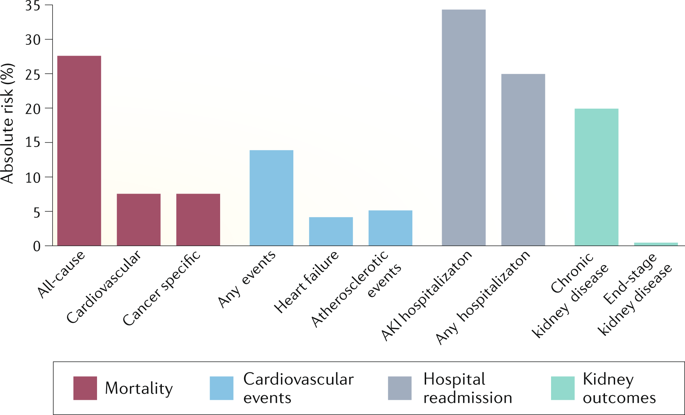当前位置:
X-MOL 学术
›
Nat. Rev. Nephrol.
›
论文详情
Our official English website, www.x-mol.net, welcomes your feedback! (Note: you will need to create a separate account there.)
Long-term outcomes of acute kidney injury and strategies for improved care.
Nature Reviews Nephrology ( IF 41.5 ) Pub Date : 2020-02-12 , DOI: 10.1038/s41581-019-0247-z Matthew T James 1, 2, 3, 4 , Meha Bhatt 1 , Neesh Pannu 5 , Marcello Tonelli 1, 2, 3, 4
Nature Reviews Nephrology ( IF 41.5 ) Pub Date : 2020-02-12 , DOI: 10.1038/s41581-019-0247-z Matthew T James 1, 2, 3, 4 , Meha Bhatt 1 , Neesh Pannu 5 , Marcello Tonelli 1, 2, 3, 4
Affiliation

|
Acute kidney injury (AKI), once viewed predominantly as a self-limited and reversible condition, is now recognized as a growing problem associated with significant risks of adverse long-term health outcomes. Many cohort studies have established important relationships between AKI and subsequent risks of recurrent AKI, hospital re-admission, morbidity and mortality from cardiovascular disease and cancer, as well as the development of chronic kidney disease and end-stage kidney disease. In both high-income countries (HICs) and low-income or middle-income countries (LMICs), several challenges exist in providing high-quality, patient-centered care following AKI. Despite advances in our understanding about the long-term risks following AKI, large gaps in knowledge remain about effective interventions that can improve the outcomes of patients. Therapies for high blood pressure, glycaemic control (for patients with diabetes), renin-angiotensin inhibition and statins might be important in improving long-term cardiovascular and kidney outcomes after AKI. Novel strategies that incorporate risk stratification approaches, educational interventions and new models of ambulatory care following AKI have been described, and some of these are now being implemented and evaluated in clinical studies in HICs. Care for AKI in LMICs must overcome additional barriers due to limited resources for diagnosis and management.
中文翻译:

急性肾损伤的长期预后及改善护理的策略。
急性肾损伤(AKI)一度主要被看作是一种自我限制和可逆的疾病,现在被认为是一个日益严重的问题,与长期健康结果不利的重大风险相关。许多队列研究已经建立了AKI与随后的AKI复发风险,医院再次入院,心血管疾病和癌症的发病率和死亡率以及慢性肾脏病和终末期肾脏疾病的发展之间的重要关系。在高收入国家(HIC)和低收入或中等收入国家(LMIC)中,在AKI后提供高质量,以患者为中心的护理方面都存在一些挑战。尽管我们对AKI术后长期风险的了解有所进步,但在有效干预措施方面仍存在很大的知识空白,这些措施可以改善患者的预后。高血压,血糖控制(针对糖尿病患者),肾素-血管紧张素抑制药和他汀类药物的治疗对改善AKI后长期的心血管和肾脏结局可能很重要。已经描述了结合风险分层方法,教育干预措施和AKI后门诊护理新模型的新策略,并且其中一些策略正在HIC的临床研究中进行实施和评估。由于诊断和管理资源有限,中低收入国家的AKI护理必须克服其他障碍。已经描述了AKI后的教育干预措施和门诊护理的新模型,其中一些正在HIC的临床研究中进行实施和评估。由于诊断和管理资源有限,中低收入国家的AKI护理必须克服其他障碍。已经描述了AKI后的教育干预措施和门诊护理的新模型,其中一些正在HIC的临床研究中进行实施和评估。由于诊断和管理资源有限,中低收入国家的AKI护理必须克服其他障碍。
更新日期:2020-02-12
中文翻译:

急性肾损伤的长期预后及改善护理的策略。
急性肾损伤(AKI)一度主要被看作是一种自我限制和可逆的疾病,现在被认为是一个日益严重的问题,与长期健康结果不利的重大风险相关。许多队列研究已经建立了AKI与随后的AKI复发风险,医院再次入院,心血管疾病和癌症的发病率和死亡率以及慢性肾脏病和终末期肾脏疾病的发展之间的重要关系。在高收入国家(HIC)和低收入或中等收入国家(LMIC)中,在AKI后提供高质量,以患者为中心的护理方面都存在一些挑战。尽管我们对AKI术后长期风险的了解有所进步,但在有效干预措施方面仍存在很大的知识空白,这些措施可以改善患者的预后。高血压,血糖控制(针对糖尿病患者),肾素-血管紧张素抑制药和他汀类药物的治疗对改善AKI后长期的心血管和肾脏结局可能很重要。已经描述了结合风险分层方法,教育干预措施和AKI后门诊护理新模型的新策略,并且其中一些策略正在HIC的临床研究中进行实施和评估。由于诊断和管理资源有限,中低收入国家的AKI护理必须克服其他障碍。已经描述了AKI后的教育干预措施和门诊护理的新模型,其中一些正在HIC的临床研究中进行实施和评估。由于诊断和管理资源有限,中低收入国家的AKI护理必须克服其他障碍。已经描述了AKI后的教育干预措施和门诊护理的新模型,其中一些正在HIC的临床研究中进行实施和评估。由于诊断和管理资源有限,中低收入国家的AKI护理必须克服其他障碍。



























 京公网安备 11010802027423号
京公网安备 11010802027423号